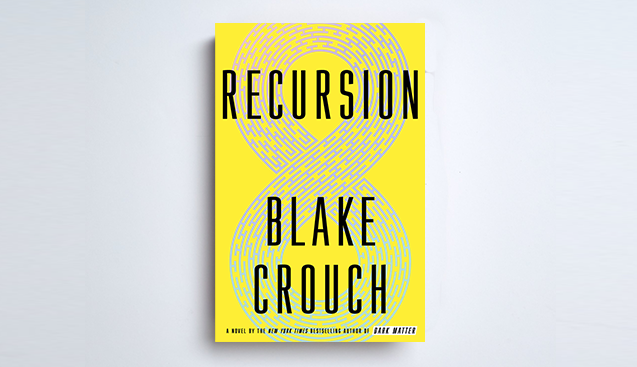Memory Doesn’t Serve in Blake Crouch’s Recursion
 A mysterious illness that meddles with memories. A seemingly endless series of time loops. At least five nuclear holocausts. And, at the center of it all, one well-intended, yet accursed invention.
A mysterious illness that meddles with memories. A seemingly endless series of time loops. At least five nuclear holocausts. And, at the center of it all, one well-intended, yet accursed invention.
If I were to use one word only to describe Recursion, the latest novel from master mindbender Blake Crouch, it would be “anxiety.”
Recursion
Recursion
By Blake Crouch
In Stock Online
Hardcover $30.00
Tense, twisty, and complex, Recursion is not a sequel to Crouch’s previous novel, Dark Matter, but it explores similar themes, including the twin ideas of the fluidity of space and time and our inadequate understanding of both. Both stories barrel through these existential quandaries (and reams of scientific theory) with the speed of a runaway train—to exhilarating effect.
Tense, twisty, and complex, Recursion is not a sequel to Crouch’s previous novel, Dark Matter, but it explores similar themes, including the twin ideas of the fluidity of space and time and our inadequate understanding of both. Both stories barrel through these existential quandaries (and reams of scientific theory) with the speed of a runaway train—to exhilarating effect.
Recursion looks askance at the same central issue as its predecessor—the opportunity cost of pursuing a life not lived—through an entirely different, more introspective lens. Here, it takes the form of twin timelines that combine and combust halfway through the novel.
On one track, you have NYPD detective Barry Sutton, who is drawn to a distraught Ann Voss Peters as she prepares to jump to her death from a skyscraper in 2018 New York. Barry is unsuccessful in his attempts to talk her down, but the conversation opens up a new mystery for him: False Memory Syndrome, a condition that leaves sufferers (including Ann) with complete memories of different, unlived lives, nearly as vivid and real as those they currently inhabit. This moment is a turning point for Barry, who—as detectives are want to do—launches his own off-the-books investigation of the disease and its spread.
Meanwhile, 11 years earlier, Helena Smith sits on the other track. She’s a brilliant neuroscientist hammering out the concept of a machine that could help people like her mother (succumbing steadily to dementia) recapture lost memories. She labors largely in obscurity and with minimal funding until a representative of Marcus Slade, the inventor and mogul, offers her the opportunity of a lifetime: unlimited resources to realize her dream.
Dark Matter
Dark Matter
By Blake Crouch
In Stock Online
Hardcover $30.00
Of course, that offers comes with a catch, one Helena won’t recognize until it’s almost too late and one that sends her hurtling into the path of Barry, a decade away (for those of us operating in linear time).
Of course, that offers comes with a catch, one Helena won’t recognize until it’s almost too late and one that sends her hurtling into the path of Barry, a decade away (for those of us operating in linear time).
It’s difficult to say much about the way in which their paths cross without trampling on the intricately plotted details of Crouch’s lightning-paced thriller. Given the nature of Barry’s discovery and Helena’s invention, that they’re connected is obvious. And perhaps, judging by the name of the novel, you can start to guess at the rough outline of that connection. But Crouch has shown himself a master of both mystery and thriller, and he doles out concepts and clues at an exacting rate to keep you intrigued without, in the process, breaking your brain with theory and philosophy.
You may know where the train is headed on its parallel tracks, but Crouch changes the landscape and topography repeatedly as his characters grapple with the dilemma of knowing too much and too little all at the same time.
While the action in Recursion is by no means confined to a single place or time or the laws of nature as we know them, the novel carries an unmistakable claustrophobia. The weight of the world bears down on both Barry and Helena, and I felt the full sum of that burden in my chest, tightening with each impossible decision they’re forced to make. The decision to set the action within the last decade, our own time fraught with its ever-present emotional tensions and turbulence, is a sound one that forges a weary bond between reader and character. Even the plot points that seem the most out-of-this-world feel like they could be par for the current global course.
The novel is a race—part sprint, part marathon, part relay—to stuff a technological genie back into its bottle and, quite honestly, you don’t know if it’s a race to be won until the final chapter. Recursion is an anxiety-spiking thrill ride that demands to be read in as few sittings as possible. What better endorsement could there be for science fiction in 2019?

